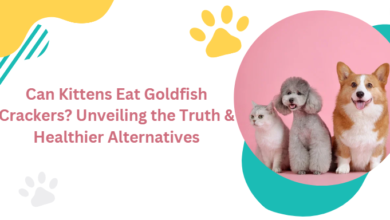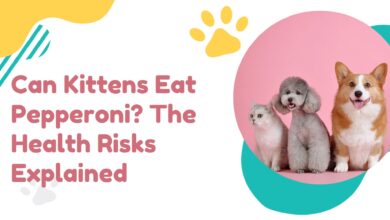Can Kittens Eat Greenies? The Surprising Answer
The Essential Guide to Feeding Kittens for Optimal Health and Growth

Who can resist those big innocent eyes begging for a taste of your snack?
As a new kitten parent, you may be wondering if treats made for dogs, like Greenies dental chews, are safe for your curious feline friend.
Can Kittens Eat Greenies?

The short answer is no – Greenies are not recommended for kittens. Let’s look at why kittens and Greenies don’t mix well.
Greenies are a popular dental treat marketed specifically for dogs. The ingredients, nutrients, and texture are tailored for a canine’s needs, not a growing kitten’s.
What Do the Experts Say?
We interviewed Dr. Sarah Moore, a veterinary nutrition specialist, who cautions that “Greenies contain a lot of carbohydrates and calories that kittens don’t need.
More importantly, they lack the right balance of proteins, amino acids, and vitamins that kittens require to develop properly.”
At What Age Can I Give My Kitten Treats?
You should wait until your kitten is at least 6-12 months old before introducing any treats outside of their regular diet.
Even treats made for cats can disrupt the precise nutritional balance needed for a kitten under one year of age. Their tiny teeth and jaws are designed for easy chewing and swallowing of soft, wet food.
Greenies contain ingredients like wheat, glycerin, and gelatin – hard for tiny kitten throats to safely chew and swallow.
The small size and cylindrical shape present a clear choking hazard, warns Dr. Moore. Large pieces can even cause dangerous blockages in little kitten tummies.
Kittens should only have kitten food until 6-12 months old. Their high metabolism demands more calories, proteins, vitamins, and minerals per ounce than adult cat food provides.
Dr. Moore explains that “Adult cat food doesn’t supply the essential amino acids for proper muscle growth and neurological development.”
Treats like Greenies are not formulated to meet kittens’ unique nutritional requirements. They lack two key amino acids kittens need – taurine and arginine.
A taurine deficiency can cause heart and vision problems in kittens.
When Can Kittens Have Treats?
You should wait until your kitten is at least 6-12 months old before introducing any treats outside of their regular diet.
Even treats made for cats can disrupt the precise nutritional balance needed for a kitten under one year of age.
While it may be tempting to share a tasty Greenie with your kitten, hold off until she’s at least one year old. Stick to high-quality kitten food and monitor her growth and health closely.
Your patience will pay off with a healthy, happy kitty down the road.
Dangers of Feeding Dogs Treats to Kittens
In your quest to spoil your new kitten, you may be tempted to share tasty treats meant for other pets. However, human food and treats made for dogs can be very harmful to kittens.
Let’s explore the risks and safer treatment alternatives.
Can kittens have dog food? Absolutely not! Dog food is formulated to meet the nutritional needs of dogs, which are very different from cats.
Dog food is typically lower in protein and lacks adequate levels of taurine – an essential amino acid for cats.
In fact, in March 2022 over 100 cat food brands were recalled due to dangerously low levels of thiamine and taurine that caused heart disease in cats eating the defective food.
This alarming incident highlights the potential harm of nutritional deficiencies in cat food.
While some human food is safe for cats in moderation, feeding people food to kittens can also be problematic. Dairy products cause digestion issues because kittens are lactose intolerant.
Seasonings and spices can damage their little livers. Fatty or sugary foods quickly lead to obesity. And remember – kittens have tiny throats easily blocked by bones, kernels, or chunks.
When Can Kittens Have Treats?
You should wait until your kitten is at least 6-12 months old before introducing any treats outside of their regular diet.
Even treats made for cats can disrupt the precise nutritional balance needed for a kitten under one year of age.
Instead of dog treats or table scraps, look for high-protein kitten treats made with real meat, chicken, or fish as the first ingredient. Freeze-dried options are easily digestible.
Limit portion sizes to a few tiny pieces and track for signs of allergies.
How To Introduce Treats Safely
- Wait until your kitten is at least 6-12 months old
- Consult your vet on appropriate treatment options
- Only give 1-2 treats at a time, no more than twice a week
- Watch closely for signs of allergies or digestion issues
- Never replace meals with treats – they lack balanced nutrition
While it’s exciting to share new flavors and foods with your kitten, wait until she’s developmentally ready. Stick to kitten-safe recipes approved by your vet.
With patience and care, you’ll both enjoy treat time when the time is right.
Feeding Kittens for Healthy Growth and Development
Raising a healthy, thriving kitten starts with proper nutrition. Understanding your kitten’s unique dietary needs is crucial for supporting their growth and development in those vital first years.
Kittens need a protein-rich diet with nutrients tailored specifically for their high metabolism and rapid growth.
High-quality kitten food provides the right balance of proteins, amino acids, vitamins, and minerals. This includes ample taurine, arginine, Vitamin A, calcium, and phosphorus.
Read More: Can Cats Eat Dragon Fruit?
Tips for Feeding Kittens
- Feed kitten formula or wet/dry kitten food only
- Offer small, frequent meals – kittens have tiny tummies
- Provide constant access to fresh, filtered water
- Gradually transition between food types over 5-7 days
To recommend budget-friendly options, we compiled this cost comparison chart of top-rated kitten food brands that meet strict nutritional criteria:
With the right diet, your kitten is less prone to common health issues like:
- Diarrhea from abrupt food changes or parasites
- Dehydration from frequent vomiting or nausea
- Food allergies manifesting as skin irritation or ear infections
- Tooth decay from eating sugary people’s food/treats
But what if your curious kitten sneaks a Greenie despite your best efforts? Contact your vet or pet poison control immediately if your kitten gets into any people’s food or pet treats not specifically made for kittens.
They may advise you to induce vomiting only if the treat was swallowed recently.
Closely monitor for signs of intestinal blockage, like appetite loss or lethargy. Rush to the vet if you notice any distress.
Do NOT make your kitten vomit unless your vet recommends it, as this can potentially worsen obstruction.
With diligence and patience in providing proper kitten nutrition, your little one will grow into a healthy, happy cat!

